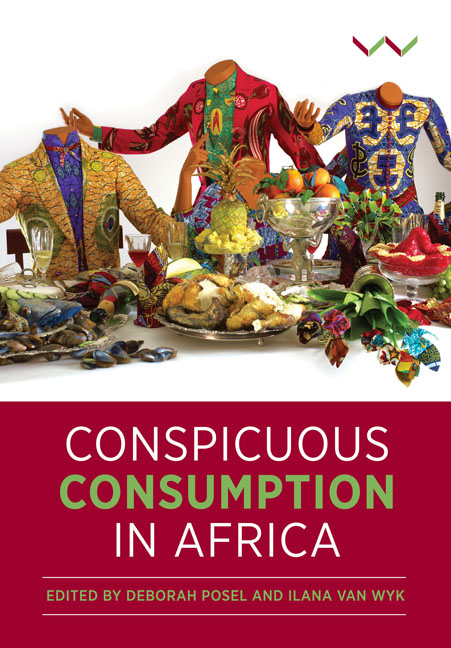Book contents
- Frontmatter
- Contents
- Acknowledgements
- List of Illustrations
- 1 Thinking With Veblen: Case Studies From Africa's Past and Present
- 2 Changes in the Order of Things: Department Stores and the Making of Modern Cape Town
- 3 Conspicuously Public: Gendered Histories of Sartorial and Social Success in Urban Togo
- 4 Etienne Rousseau, Broedertwis and the Politics of Consumption Within Afrikanerdom
- 5 Recycling Consumption: Political Power and Elite Wealth in Angola
- 6 Chiluba's Trunks: Consumption, Excess and the Body Politic in Zambia
- 7 Jacob Zuma's Shamelessness: Conspicuous Consumption, Politics and Religion
- 8 Precarious ‘Bigness’: a ‘Big Man’, His Women and His Funeral in Cameroon
- 9 Young Men of Leisure? Youth, Conspicuous Consumption and the Performativity of Dress in Niger
- 10 Booty on Fire: Looking at Izikhothane With Thorstein Veblen
- 11 Conspicuous Queer Consumption: Emulation and Honour in the Pink Map
- 12 The Politics and Moral Economy of Middle-Class Consumption in South Africa
- 13 Marigold Beads: Who Needs Diamonds?!
- Contributors
- Index
3 - Conspicuously Public: Gendered Histories of Sartorial and Social Success in Urban Togo
Published online by Cambridge University Press: 29 October 2019
- Frontmatter
- Contents
- Acknowledgements
- List of Illustrations
- 1 Thinking With Veblen: Case Studies From Africa's Past and Present
- 2 Changes in the Order of Things: Department Stores and the Making of Modern Cape Town
- 3 Conspicuously Public: Gendered Histories of Sartorial and Social Success in Urban Togo
- 4 Etienne Rousseau, Broedertwis and the Politics of Consumption Within Afrikanerdom
- 5 Recycling Consumption: Political Power and Elite Wealth in Angola
- 6 Chiluba's Trunks: Consumption, Excess and the Body Politic in Zambia
- 7 Jacob Zuma's Shamelessness: Conspicuous Consumption, Politics and Religion
- 8 Precarious ‘Bigness’: a ‘Big Man’, His Women and His Funeral in Cameroon
- 9 Young Men of Leisure? Youth, Conspicuous Consumption and the Performativity of Dress in Niger
- 10 Booty on Fire: Looking at Izikhothane With Thorstein Veblen
- 11 Conspicuous Queer Consumption: Emulation and Honour in the Pink Map
- 12 The Politics and Moral Economy of Middle-Class Consumption in South Africa
- 13 Marigold Beads: Who Needs Diamonds?!
- Contributors
- Index
Summary
In the history of African consumption and concerns with the body, the use of imported goods, especially cloth, is long-standing in the making of ‘vernacular cosmopolitanisms’ (Bhabha 1994). Such imports serve as ingredients to vernacular dramaturgies of power, often performed through the aesthetics of excess. There are numerous examples of conspicuous displays of wealth and power through adornment: from the ‘big men’ styles of local chiefs to contemporary politicians (South Africa's Julius Malema's pink suits, most recently); from colonial dandies to contemporary Congolese sappeurs (Gondolo 1999), via Ivorian bluffeurs (Newell 2012) or South African township youths burning designer clothes in the style of izikhothane (Mnisi, see chapter 10, this volume). Although the conspicuous display of wealth through sumptuous attire is primarily written about in relation to men, especially so-called ‘big men’, there are numerous historical and contemporary examples of the centrality of women's fashions: the decadent styles of Senegalese diaranka in Dakar (Mustafa 1998), the flamboyant fashions of Asante Hightimers in Ghana (Gott 2009), or the entrepreneurial styles of ‘big women’ or ‘female Alhajis’ in Nigeria (Bastian 1996).
Concerns with material abundance and ostentatious display are not unique to West Africa. Nor are moral evaluations about the appropriateness of the accumulation of wealth and the flashy display of material objects – what Veblen (2009 [1899]) famously called conspicuous consumption. While Veblen wrote in a different time and place, scorning the ostentatious wealth of the late-nineteenth-century American leisure class, his insights (albeit evolutionary and misogynist in scope) about status performance through conspicuous consumption have traveled and continue to bear relevance in other temporal and geographic contexts. How might Veblen's concept of conspicuous consumption help theorise West African, and specifically Togolese, notions of status performance and material abundance from the mid- and late colonial period to the contemporary context of economic crisis and rampant inequality? Specifically, how might thinking with an avowedly female aesthetic of sartorial excess, one which Veblen failed to conceptualise as an autonomous female project (not fashioned in relation to men), further our understanding of conspicuous consumption in colonial and postcolonial Africa? Veblen's interest in women's nineteenth-century fashion was determined by his thesis that the leisure class was driven by a way of life given over to the maintenance and acquisition of the honourable repute of men.
- Type
- Chapter
- Information
- Conspicuous Consumption in Africa , pp. 45 - 62Publisher: Wits University PressPrint publication year: 2019



